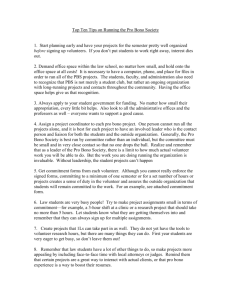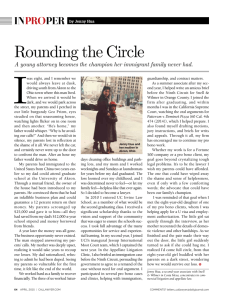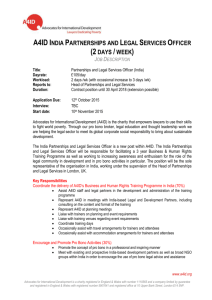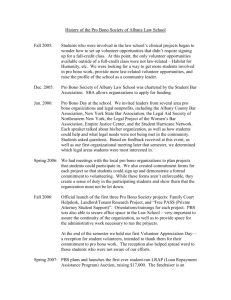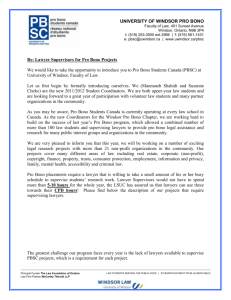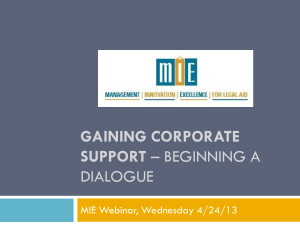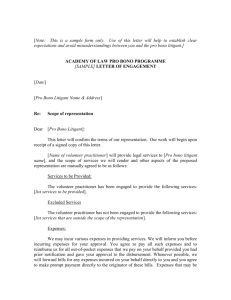Medtronic ProBono Program Policy
advertisement
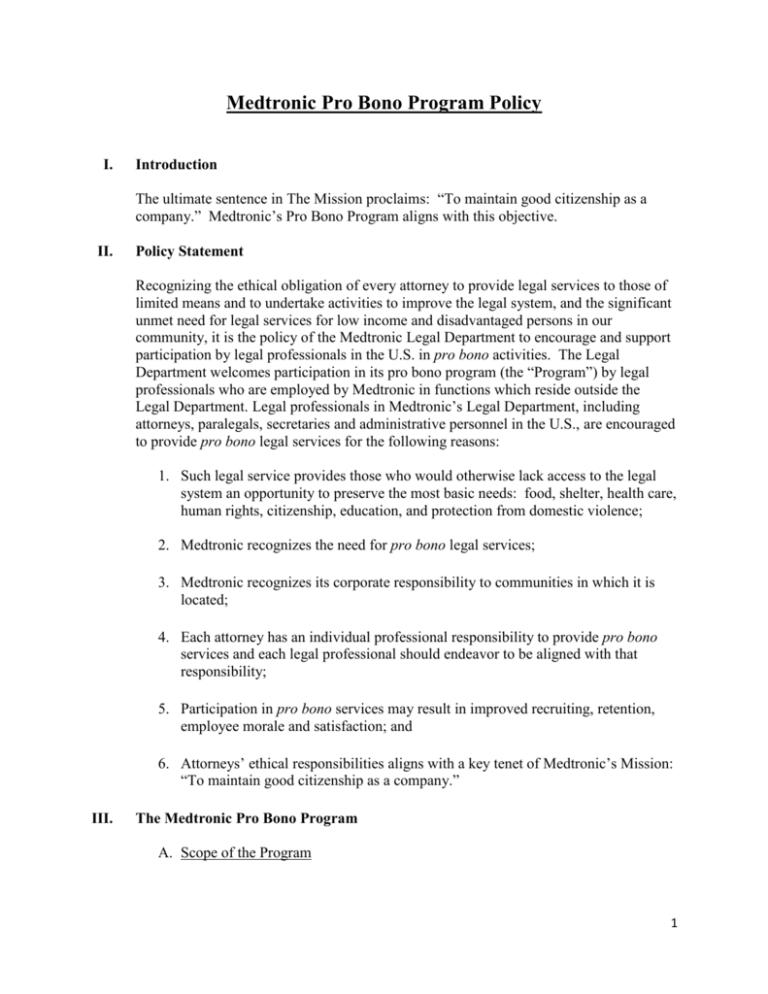
Medtronic Pro Bono Program Policy I. Introduction The ultimate sentence in The Mission proclaims: “To maintain good citizenship as a company.” Medtronic’s Pro Bono Program aligns with this objective. II. Policy Statement Recognizing the ethical obligation of every attorney to provide legal services to those of limited means and to undertake activities to improve the legal system, and the significant unmet need for legal services for low income and disadvantaged persons in our community, it is the policy of the Medtronic Legal Department to encourage and support participation by legal professionals in the U.S. in pro bono activities. The Legal Department welcomes participation in its pro bono program (the “Program”) by legal professionals who are employed by Medtronic in functions which reside outside the Legal Department. Legal professionals in Medtronic’s Legal Department, including attorneys, paralegals, secretaries and administrative personnel in the U.S., are encouraged to provide pro bono legal services for the following reasons: 1. Such legal service provides those who would otherwise lack access to the legal system an opportunity to preserve the most basic needs: food, shelter, health care, human rights, citizenship, education, and protection from domestic violence; 2. Medtronic recognizes the need for pro bono legal services; 3. Medtronic recognizes its corporate responsibility to communities in which it is located; 4. Each attorney has an individual professional responsibility to provide pro bono services and each legal professional should endeavor to be aligned with that responsibility; 5. Participation in pro bono services may result in improved recruiting, retention, employee morale and satisfaction; and 6. Attorneys’ ethical responsibilities aligns with a key tenet of Medtronic’s Mission: “To maintain good citizenship as a company.” III. The Medtronic Pro Bono Program A. Scope of the Program 1 The Program provides volunteer, pro bono publico, legal services to people and organizations which cannot afford them or where the cost of legal services would significantly deplete the organization’s economic resources or where payment would be inappropriate for other reasons. For a definition of “pro bono publico,” see Rule 6.1 of the Minnesota Rules of Professional Conduct set forth in Attachment A. Legal professionals in the Legal Department in the U.S. are encouraged to participate. Legal professionals in functions outside the U.S. Legal Department are also invited to join the Program. B. Time Commitment on Particular Matters It is expected that pro bono services will be performed during regular business hours, though exempt employees may render service on weekends, evenings and holidays at their own discretion. Employees should obtain the approval of their manager for pro bono activities which are expected to exceed 50 hours in a year. Non-exempt employees should obtain the approval of their respective managers for participation in each pro bono project, as well as possible associated overtime. Regardless, participants should schedule their pro bono activities in a way that does not interfere with their non-pro bono responsibilities. Managers should be aware that each U.S. lawyer in the Legal Department is permitted to render 50 hours of pro bono service each year and that non-lawyers are also encouraged to render such services. C. Nature of Permitted Pro Bono Services and Approval Thereof Periodically, the Pro Bono Director or Task Force will distribute information about opportunities for performing pro bono service that may appeal to Medtronic’s legal professionals. Legal professionals are free to select from the “cafeteria-style” opportunities offered by the Task Force or to take part in pro bono services of their own design. Participants in the Program need not obtain approval to engage in any particular type of pro bono activity. In general, legal professionals should avoid performing services which are likely to embarrass Medtronic. When in doubt, legal professionals should consult with the Task Force. D. Record-Keeping Program participants should keep track of time they spend on pro bono matters and the nature of the work they perform and report this information to the Director or other designated person, as requested. Program participants should also comply with any policy, documentation or time-keeping requirements of the external organizations with which they work. Currently, time spent on pro bono activities should be recorded on the Mission in Motion website under the “Volunteer” tab>”Log New Hours” tab>”Private Team or Department” Event Type>”Skills Based” event category. 2 E. Expenses & Departmental Resources The Legal Department is committed to devoting departmental resources including office space, word processing, duplicating, library materials, computers, telephones, fax machines and general office supplies to Program matters. Ordinary incidental costs associated with performing pro bono services, such as postage, parking, long-distance telephone, photocopying, fax charges, etc., should be paid from the cost center associated with the legal professional(s) performing the work. However, Program participants should make every effort to minimize all Program costs. Unless prior approval is received from the Director, the legal services organization or client should pay all extraordinary costs such as administrative costs, judicial filing fees, expert witness fees and other such extraordinary costs. F. Malpractice Insurance Generally, legal service organizations carry malpractice insurance that provides coverage for attorneys working with these organizations. Participants should not engage in pro bono service activities for which adequate insurance coverage is not provided by the sponsoring organization or partnering law firm, unless approved by the Director. G. Affiliation with Medtronic While participation is supported by Medtronic, each representation of a client is undertaken by the legal professional in his or her own individual capacity. As such, care must be taken to avoid creating the impression on the part of the client or others that Medtronic represents the client or that it endorses or supports the client’s legal position or arguments. Therefore, Program participants should not use Medtronic’s stationery for Program activities or otherwise engage in any other acts likely to convey the impression that Medtronic endorses or supports the client’s position. Program participants should utilize the stationary provided by the legal service or civic organization they are assisting or develop their own stationery (e.g., Employee, Esq., c/o Medtronic Legal Department). H. Training, Mentoring & Teams Program participants should exercise their best judgment regarding their qualifications to handle the legal issues necessary to provide pro bono legal assistance. Program participants should obtain the training which is necessary for them to handle the issues they most likely will be asked to handle. Training is available through various legal service organizations, bar associations, law firms, and CLE course offerings. Mentoring may be necessary for participants who are working outside of their areas of expertise or knowledge. Mentors may be legal professionals in private practice or employed by outside legal service organizations, or other Medtronic legal professionals. Also, time demands or the 3 nature of a particular pro bono matter or project may require the involvement of more than one Program participant. The Task Force can assist in identifying potential mentors or team members. I. Conflicts of Interest Before entering into a lawyer-client relationship or agreeing to provide legal services, the Program participant must determine whether the issues in a given matter present a conflict of interest. In determining whether a conflict of interest exists, the Program participant must consider Medtronic’s interest and whether the case would place Medtronic in an adversarial position to a party with whom Medtronic does not wish to be or should not be adversarial. When in doubt as to whether a conflict exists, the Program participant should consult with the Task Force or its designee on such matters. For the purposes of the Program, conflicts of interest include, but are not limited to, direct conflicts, business/public relations conflicts, and politically sensitive issues. If, during the initial interview, it appears that a conflict exists, the Program should notify the applicant and decline any representation in the matter. J. Recognition The Program participants will be recognized on an annual basis for their pro bono services. The Task Force will coordinate such recognition. IV. Administration A. Task Force and Director of the Program The Program will be administered by a Task Force comprised of legal professionals from each of the cities in the U.S. in which Medtronic has a legal department, chaired by the Director. The Director and the Task Force will be volunteers appointed by the General Counsel. The responsibilities of the Task Force and Director include the following: 1. Implementing and monitoring the Program; 2. Coordinating the participation of legal professionals in the Program; 3. Coordinating the provision of training (which may be provided by the outside legal service organization) for Program participants in legal areas unfamiliar to participants; 4. Seeking out and receiving requests for pro bono services from community referral organizations and law firms; 4 5. Periodically collecting and distributing information regarding such pro bono services and offering them to Medtronic’s legal professionals as opportunities to participate in the Program; 6. Reporting on pro bono activities to the General Counsel or appropriate committee(s) as requested; 7. Preparing an Annual Report on the status of the Program; 8. Consulting on conflict of interest questions; and 9. Acting as a resource and answering any questions regarding the Program. 5 ATTACHMENT A PUBLIC SERVICE RULE 6.1 VOLUNTARY PRO BONO PUBLICO SERVICE A lawyer should aspire to render at least 50 hours of pro bono publico legal services per year. In fulfilling this responsibility, the lawyer should: (a) provide a substantial majority of the 50 hours of legal services without fee or expectation of fee to: (1) persons of limited means or (2) charitable, religious, civic, community, governmental and educational organizations in matters which are designed primarily to address the needs of persons of limited means; and (b) provide any additional services through: (1) delivery of legal services at no fee or substantially reduced fee to individuals, groups or organizations seeking to secure or protect the civil rights, civil liberties or public rights, or charitable, religious, civic, community, governmental and educational organizations in matters in furtherance of their organizational purposes, where the payment of standard legal fees would significantly deplete the organization's economic resources or would be otherwise inappropriate; (2) delivery of legal services at a substantially reduced fee to persons of limited means; or (3) participation in activities for improving the law, the legal system or the legal profession. In addition, a lawyer should voluntarily contribute financial support to organizations that provide legal services to persons of limited means. Comment The ABA House of Delegates has formally acknowledged "the basic responsibility of each lawyer engaged in the practice of law to provide public interest legal services" without fee, or at a substantially reduced fee, in one or more of the following areas: poverty law, civil rights law, public rights law, charitable organization representation and the administration of justice. This Rule expresses that policy but is not intended to be enforced through disciplinary process. The rights and responsibilities of individuals and organizations in the United States are increasingly defined in legal terms. As a consequence, legal assistance in coping with the web of statutes, rules and regulations is imperative for persons of modest and limited means, as well as for the relatively well-to-do. The basic responsibility for providing legal services for those unable to pay ultimately rests upon the individual lawyer, and personal involvement in the problems of the disadvantaged can be one of the most rewarding experiences in the life of a lawyer. Every lawyer, regardless of professional prominence or professional workload, should find time to participate in or otherwise support the provision of legal services to the disadvantaged. The provision of free legal services to those unable to pay reasonable fees continues to be an obligation of each lawyer as well as the profession generally, but the efforts of individual lawyers are often not enough to meet the need. Thus, it has been necessary for the profession and government to institute additional programs to provide legal services. Accordingly, legal aid offices, lawyer referral services and other related programs have been developed, and others will be developed by the profession and government. Every lawyer should support all proper efforts to meet this need for legal services. 6 Comment Every practicing lawyer, regardless of professional prominence or professional work load, has a responsibility to provide legal services to those unable to pay, and personal involvement in the problems of the disadvantaged can be one of the most rewarding experiences in the life of a lawyer. All practicing lawyers should aspire to provide a minimum of 50 hours of pro bono services annually. It is recognized that in some years a lawyer may render greater or fewer than 50 hours but during the course of a legal career, each lawyer should aspire to render on average of 50 hours of service per year. Services can be performed in civil matters or in criminal or quasicriminal matters for which there is no government obligation to provide funds for legal representation, such as post-conviction death penalty appeal cases. Paragraphs (a)(1) and (2) recognize the critical need for legal services that exists among persons of limited means by providing that a substantial majority of the legal services rendered annually be furnished to the disadvantaged without fee or expectation of fee. Legal services under these paragraphs consist of a full range of activities, including individual and class representation, the provision of legal advice, legislative lobbying, administrative rule making and the provision of free training or mentoring to those who represent persons of limited means and otherwise contributing legal talents. The variety of these activities should facilitate participation by government attorneys, even when restrictions exist on their engaging in the outside practice of law. Persons eligible for legal services under paragraphs (a)(1) and (2) are those who qualify for participation in programs funded by the Legal Services Corporation and those whose incomes and financial resources are slightly above the guidelines utilized by such programs but nevertheless cannot afford counsel, legal services can be rendered to individuals or to organizations such as homeless shelters, battered women's centers and food pantries that serve those of limited means. The term "governmental organizations" includes, but is not limited to, public protection programs and sections of governmental or public sector agencies. Because service must be provided without fee or expectation of fee, the intent of the lawyer to render free legal services is essential for the work performed to fall within the meaning of paragraphs (a)(1) and (2). Accordingly, services rendered cannot be considered pro bono if an anticipated fee is uncollected, but the award of statutory attorneys fees in a case originally accepted as pro bono would not disqualify such services from inclusion under this section. Lawyers who do receive fees in such cases are encouraged to contribute an appropriate portion of such fees to organizations or projects that benefit persons of limited means. While it is possible for a lawyer to fulfill the annual responsibility to perform pro bono services exclusively through activities described in paragraphs (a)(1) and (2), to the extent that any hours of service remain unfulfilled, the remaining commitment can be met in a variety of ways as set forth in paragraph (b). Constitutional, statutory, or regulatory restrictions may prohibit or impede government and public sector lawyers and judges from performing the pro bono services outlined in paragraphs (a)(1) and (2). Accordingly, where those restrictions apply, government and public sector lawyers and judges may fulfill their pro bono responsibility by performing services .outlined in paragraph (b). Paragraph (b)( 1 ) includes the provision of certain types of legal services to those whose incomes and financial resources place them above limited means. It also permits the pro bono attorney to accept a substantially reduced fee for services. Examples of the types of issues that may be addressed under this paragraph include First Amendment claims, Title VII claims and environmental claims. Additionally, a wide range of organizations may be represented, including social service, medical research, cultural and religious groups. Paragraph (b)(2) covers instances in which attorneys agree to and receive a modest fee for furnishing legal services to persons of limited means. Participation in judicare programs and acceptance of court appointments in which the fee is substantially below a lawyer's usual rate are encouraged under this section. Paragraph (b)(3) recognizes the value of lawyers engaging in activities that improve the law, the legal system or the legal profession. Serving on bar association committees, serving on boards of pro bono or legal services programs, taking part in Law Day activities, acting as a continuing legal education instructor, a mediator or an arbitrator and engaging in legislative lobbying to improve the law, the legal system or the profession are a few examples of the many activities that fall within this paragraph. 7 Because the provision of pro bono services is a professional responsibility, it is the individual ethical commitment of each lawyer. Nevertheless, there may be times when it is not feasible for a lawyer to engage in pro bono services. At such times a lawyer may discharge the pro bono responsibility by providing financial support to organizations providing free legal services to persons of limited means. Such financial support should be reasonably equivalent to the value of the hours of service that would have otherwise been provided. In addition, at times it may be more feasible to satisfy the pro bono responsibility collectively, as by a firm's aggregate pro bono activities. Because the efforts of individual lawyers are not enough to meet the need for free legal services that exists among persons of limited means, the government and the profession have instituted additional programs to provide those services. Every lawyer should financially support such programs, in addition to either providing direct pro bono services or making financial contributions when pro bono service is not feasible. The responsibility set forth in this Rule is not intended to be enforced through disciplinary process. 8
